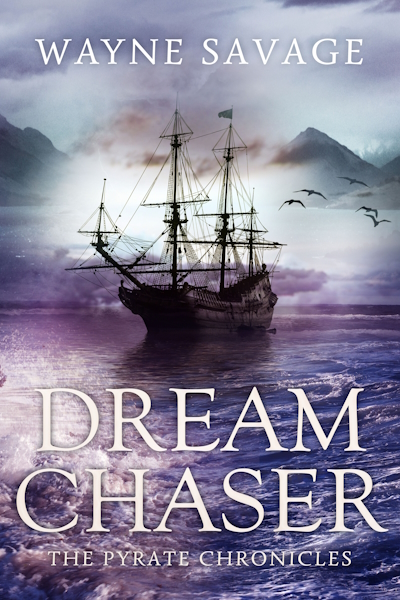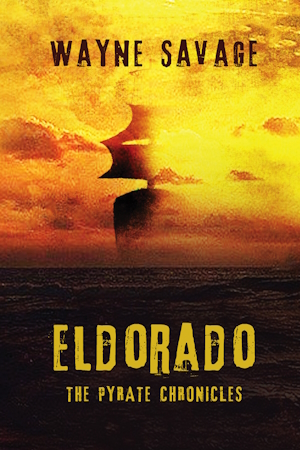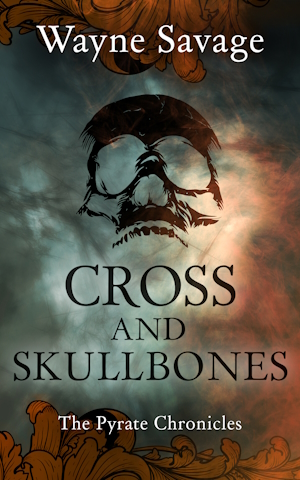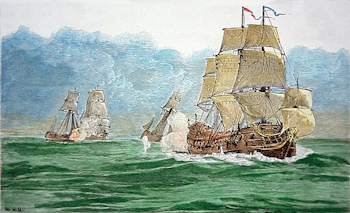 The terms pirate and privateer are unclear to many people, but there was a clear distinction which was made between the two in the past, even if a shadowy grey area did exist for many people. In fact, during the Age of Sail, one man’s privateer was often another man’s pirate. First we must look at what a pirate is. The word itself is derived with the Greek peiratēs, meaning brigand, and like a brigand or bandit there were no restrictions on whom they attacked. They were outlaws plain and simple, possessing no legal commission, or one which covered the specific act of aggression they carried out. They often had their own flags, usually only flying the flag of a nation under false colours to trick their prey, although those pirates who considered themselves patriots might have flown the flag of their own nation too. They usually obtained their vessel by means of mutiny or capture.…
The terms pirate and privateer are unclear to many people, but there was a clear distinction which was made between the two in the past, even if a shadowy grey area did exist for many people. In fact, during the Age of Sail, one man’s privateer was often another man’s pirate. First we must look at what a pirate is. The word itself is derived with the Greek peiratēs, meaning brigand, and like a brigand or bandit there were no restrictions on whom they attacked. They were outlaws plain and simple, possessing no legal commission, or one which covered the specific act of aggression they carried out. They often had their own flags, usually only flying the flag of a nation under false colours to trick their prey, although those pirates who considered themselves patriots might have flown the flag of their own nation too. They usually obtained their vessel by means of mutiny or capture.…
François l’Olonnais
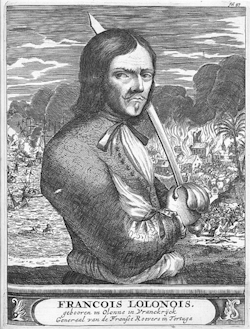 Francois l’Olonnais was renowned for being particularly cruel and was especially feared by the Spanish colonists. Very little is know about his early life. It is known that his real name was Jean-David Nau and that he later became known as Francois l’Olonnais, meaning Frenchman from Sables-d’Olonne, referring the place he was born in sometime between 1630 and 1635. It is thought he received this name while on Tortuga. He was also sometimes simply known as Captain Francois. His family were so poor they sold him or he sold himself as an indentured servant to the French West India Company when he was fifteen. At first, he was sent to work on a sugar plantation in the French colony of Martinique in the Caribbean in the 1650s, sometime later ending up on Tortuga, off the coast of Hispaniola. While serving his three-year indenture, he got to know many buccaneers. What we know of this infamous pirate captain comes mostly from Alexandre Exquemelin’s 1678 account in the Dutch version The History of the Buccaneers of America.…
Francois l’Olonnais was renowned for being particularly cruel and was especially feared by the Spanish colonists. Very little is know about his early life. It is known that his real name was Jean-David Nau and that he later became known as Francois l’Olonnais, meaning Frenchman from Sables-d’Olonne, referring the place he was born in sometime between 1630 and 1635. It is thought he received this name while on Tortuga. He was also sometimes simply known as Captain Francois. His family were so poor they sold him or he sold himself as an indentured servant to the French West India Company when he was fifteen. At first, he was sent to work on a sugar plantation in the French colony of Martinique in the Caribbean in the 1650s, sometime later ending up on Tortuga, off the coast of Hispaniola. While serving his three-year indenture, he got to know many buccaneers. What we know of this infamous pirate captain comes mostly from Alexandre Exquemelin’s 1678 account in the Dutch version The History of the Buccaneers of America.…
Piracy Act 1744
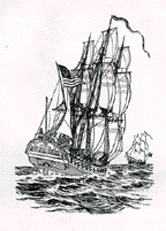 Under this act British subjects serving as privateers for an enemy of Great Britain could be tried for a felony not treason. It was easier to convict someone of a felony than prove treason. It was passed during the War of Austrian Succession waged from 1740 to 1748, in which Britain fought against France and Spain. As with many wars before, privateers were an integral part of the armed forces of all powers, and it would seem that British citizens regulary found employment with foreign powers.
Under this act British subjects serving as privateers for an enemy of Great Britain could be tried for a felony not treason. It was easier to convict someone of a felony than prove treason. It was passed during the War of Austrian Succession waged from 1740 to 1748, in which Britain fought against France and Spain. As with many wars before, privateers were an integral part of the armed forces of all powers, and it would seem that British citizens regulary found employment with foreign powers.
An example of using privateers to support navies, occurred in 1744, when a British force of 300 men accompanied by two privateers from Saint Kitts successfully captured the French half of neighbouring Saint Martin. In late May 1745, two French royal frigates of 36 and 30 guns respectively under Commodore La Touché, together with three privateers sailed from Martinique to invade and capture the British colony of Anguilla in retaliation, but were repelled with heavy loss in the Battle of Anguilla.…
Piracy Act 1721
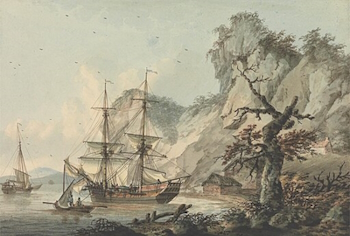 This act’s longer title is: An Act for the more effectual suppressing of Piracy. Its aim was to counter the rapid growth of piracy in the early 18th century by removing some deficiencies in the preceding piracy laws. It was mainly concerned with those who dealt with and supported the pirates and other criminals, requiring commanders of vessels and others who traded with pirates or supplied them in any way to be treated as pirates themselves. The act included provisions for the confiscation of any ill-gotten cargo and the offending commander’s ship. It’s main aim was to undermined support for the pirates. The act was repealed on 5th November 1993.
This act’s longer title is: An Act for the more effectual suppressing of Piracy. Its aim was to counter the rapid growth of piracy in the early 18th century by removing some deficiencies in the preceding piracy laws. It was mainly concerned with those who dealt with and supported the pirates and other criminals, requiring commanders of vessels and others who traded with pirates or supplied them in any way to be treated as pirates themselves. The act included provisions for the confiscation of any ill-gotten cargo and the offending commander’s ship. It’s main aim was to undermined support for the pirates. The act was repealed on 5th November 1993.

